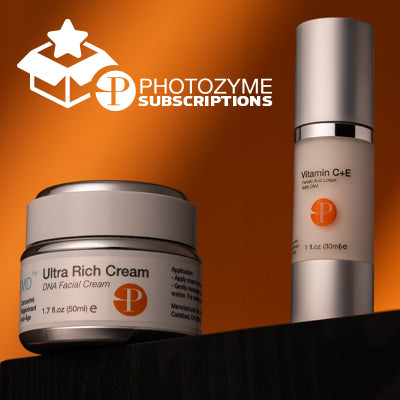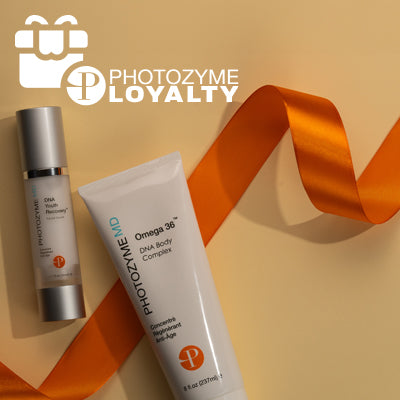
Key Takeaways:
- Importance Of SPF In Skincare: Understanding SPF and its role in skincare is crucial for protecting against UVB rays that cause sunburn and skin damage.
- Choosing The Right SPF For Your Skin: Choosing the right SPF level based on skin type and sun exposure needs is essential for adequate protection and anti-aging benefits.
- Daily SPF For Youthful, Healthy Skin: Incorporating SPF into daily skincare routines, alongside products that offer broad-spectrum UV protection, is key to maintaining youthful and healthy skin.
The sun can hurt.
Sun Protection Factor, also called SPF, is a fundamental factor in skin protection in the great outdoors. And with many people taking proactive measures to shield their skin from the sun’s harmful rays, it’s time for a refresher.
At Photozyme LLC, we recognize the importance of comprehensive skin protection as an effective anti-aging strategy. Our unique range of products, including the innovative BEYONDbloc, can help you with many skin concerns, ranging from hydration to the paramount task of protection against environmental stressors.
In this article, we’ll explore SPF, how it protects your skin from harmful UV rays, the different levels of SPF available, and why incorporating SPF into your daily skincare routine is essential for maintaining youthful, healthy skin.
Different Levels Of SPF And What They Mean
When talking about sun protection, SPF, or Sun Protection Factor, measures sunscreen's level of UVB protection. Understanding the different levels of SPF is essential for choosing the right sun protection to meet individual skin needs, especially for those concerned with anti-aging and skin health.
SPF 15
SPF 15 blocks approximately 93% of UVB rays, offering a basic level of protection for daily activities with minimal sun exposure. It's suitable for individuals who spend most of their time indoors but still want some protection against the sun's harmful effects.
SPF 30
SPF 30 is a popular choice for everyday use, blocking around 97% of UVB rays. This level is recommended for everyday wear, especially for individuals who spend a moderate amount of time outdoors. It offers more protection without being too heavy or greasy on the skin, making it a preferred option for skincare products.
SPF 50
Offering about 98% of UVB ray protection, SPF 50 is ideal for people with fair skin or those at a higher risk of skin damage due to prolonged sun exposure. It's beneficial for outdoor activities like swimming, hiking, or sports, providing a high level of protection to maintain skin health and prevent premature aging.
SPF 100
While SPF 100 offers double the protection of SPF 50, the increase is minimal, blocking approximately 99% of UVB rays. It’s crucial to note that no sunscreen can block 100% of UVB rays. This level of SPF may be beneficial for extended outdoor activities in highly reflective environments, such as snow or water, but it's essential to reapply regularly for maximum protection.
Broad Spectrum: UVA And UVB Protection Explained
When exploring the topic of "What is SPF?" It's crucial to understand the concept of broad-spectrum protection. This term refers to a sunscreen's ability to shield your skin from UVA and UVB rays, two types of ultraviolet radiation emitted by the sun, each with distinct effects on the skin.
UVA Protection
UVA rays penetrate the skin, leading to signs of premature aging, such as wrinkles and fine lines. These rays can pass through glass and clouds, meaning exposure can occur even when you're indoors or on a cloudy day. UVA protection in sunscreens is essential for preventing long-term skin damage and maintaining youthful-looking skin.
UVB Protection
On the other hand, UVB rays primarily affect the skin's outer layer, causing sunburn. These rays play a significant role in the development of skin cancer. The SPF (Sun Protection Factor) rating on sunscreen products measures the level of protection from UVB rays. For instance, if you apply sunscreen with an SPF of 30, you can stay in the sun 30 times longer without protection before burning.
The Importance Of Broad Spectrum
Broad-spectrum sunscreens provide a comprehensive shield against UVA and UVB rays, offering a more complete approach to sun protection. This is crucial for maintaining radiant skin and preventing immediate and long-term damage.
Photozyme’s skincare lineup, including BEYONDbloc and other innovative products, is designed with the importance of protection. It caters to individuals seeking efficient ways to safeguard their skin while addressing concerns like aging, hydration, and more.
The Benefits Of Regular Sunscreen Use
Understanding the significance of SPF in skincare is pivotal for maintaining healthy, youthful-looking skin. Incorporating sunscreen into your daily skincare routine brings numerous benefits, not just for beach days but for everyday exposure to the sun.
- Prevents Sunburn: Regular sunscreen use protects against UVB rays, which cause sunburn and discomfort and increase the risk of skin cancer. Using sunscreen with adequate SPF shields the skin from harmful rays and prevents sunburn.
- Fights Premature Aging: Sunscreen blocks UVA and UVB rays that contribute to fine lines, wrinkles, and changes in skin texture, helping maintain a youthful appearance. It works alongside anti-aging products like Photozyme's DNA Youth Recovery Facial Serum to preserve skin health.
- Reduces Skin Cancer Risk: Applying broad-spectrum sunscreen regularly reduces the risk of developing skin cancer, including melanoma, by blocking both UVA and UVB rays.
- Maintains Even Skin Tone: Sunscreen prevents hyperpigmentation and dark spots caused by sun exposure, promoting a clearer and more even complexion.
Sun Protection For Sensitive Skin: Tips And Recommendations
Sensitive skin requires special attention, especially when it comes to sun protection. This section offers invaluable tips and recommendations for those with delicate skin, ensuring they can enjoy the sun safely without compromising their skin health.
Understand Your Skin’s Needs
Sensitive skin reacts more intensely to external factors; the sun’s rays can cause significant damage if not adequately protected. Understanding your skin concerns like susceptibility to sunburn, reactions to chemical ingredients, or conditions like rosacea, which can be aggravated by sun exposure. Tailoring your sun protection to your unique needs ensures better care and effectiveness.
Choose The Right SPF Product
Not all sunscreens are created equal when it comes to sensitive skin. Look for products that offer broad-spectrum protection against both UVA and UVB rays. Mineral sunscreens containing zinc oxide or titanium dioxide are typically more suitable for sensitive skin as they are less likely to irritate. They work by sitting on top of the skin to physically block the sun's rays, acting as a shield rather than being absorbed.
Integrate SPF With Skincare
Incorporating sun protection into your daily skincare routine is vital. Products like Photozyme’s BEYONDbloc provide the necessary SPF and are formulated with sensitive skin in mind. This ensures that while protecting your skin from the sun, you’re also nourishing it and addressing other concerns like anti-aging.
Apply Sunscreen Generously And Frequently
For adequate protection, apply sunscreen generously to all exposed areas of the skin, including often-forgotten spots like the ears, neck, and back of the hands. Reapplication is key, especially after swimming, sweating, or towel drying. Apply sunscreen as the last step of your skincare routine before makeup, allowing it to absorb and protect your skin fully.
Seek Added Protection
Beyond sunscreen, you can protect your sensitive skin by wearing protective clothing, such as wide-brimmed hats and UV-blocking sunglasses. Seek shade whenever possible, especially during peak sun intensity hours between 10 a.m. and 4 p.m. Remember, UV rays can penetrate clouds and windows. Hence, protection is essential, even on cloudy days or indoors near windows.
Patch Test New Products
Before introducing a new sunscreen or skincare product into your routine, perform a patch test. Apply a small amount of the product to a discreet skin area and wait 24 to 48 hours to ensure no adverse reaction. This proactive approach can prevent potential irritation or allergic reactions on a larger scale.
Final Thoughts
UV radiation can accelerate skin aging and increase the risk of skin cancer, making sun protection an essential element of any skincare regimen, particularly for those concerned about maintaining youthful, healthy skin.
We at Photozyme LLC recognize the importance of protection with cornerstone skincare solutions like our BEYONDbloc. Our products combine cutting-edge research and effective sun protection factors – both instrumental in addressing anti-aging concerns and ensuring comprehensive care for your skin.
Read also:
- Sun Spots vs. Melanoma: How To Spot The Differences
- What Is Tinted Sunscreen?
- A Complete Guide To Treating Photodamaged Skin
Frequently Asked Questions About What Is SPF
How does SPF protect the skin from the sun?
SPF measures how well a sunscreen protects against UVB rays that cause sunburn and contribute to skin cancer. It absorbs, reflects, or scatters harmful radiation to prevent skin damage.
What does the SPF number mean?
The SPF number indicates how long you can stay in the sun without burning compared to no protection. SPF 30, for example, allows for 30 times more prolonged sun exposure before burning, but this varies based on skin type and sunlight intensity.
Is a higher SPF always better?
Higher SPF offers slightly more protection, but the difference becomes minimal beyond SPF 50. SPF 30 blocks 97% of UVB rays, while SPF 50 blocks 98%. Proper application and reapplication matter more.
How often should sunscreen with SPF be applied?
Sunscreen should be applied 15 to 30 minutes before sun exposure and reapplied every two hours or more frequently if swimming or sweating.
Can SPF protect against both UVA and UVB rays?
SPF primarily measures UVB protection. For complete coverage, use broad-spectrum sunscreens, which protect against UVA (skin aging) and UVB (sunburn) rays.
What is the difference between SPF and PA ratings?
SPF measures UVB protection, while PA ratings (used in Asia) measure UVA protection, with PA+ to PA++++ indicating increasing levels of UVA defense.




